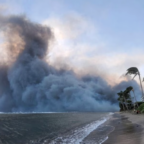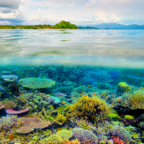
Hawaii Gov. David Ige on Tuesday signed the first bill in the country that will ban sunscreens containing chemicals harmful to coral reefs. The bill, which was passed by state lawmakers in May, will go into effect January 1, 2021. At that point, the sale or distribution of over-the-counter sunscreens containing oxybenzone and octinoxate, which help filter UV rays, will be prohibited.
A study by Haereticus Environmental Laboratory, a nonprofit scientific organization, found the chemicals cause bleaching, deformities, DNA damage and ultimately death in coral when they’re washed off beachgoers or discharged into wastewater treatment plants and deposited into bodies of water.
“Oxybenzone is really toxic to the juvenile form of corals,” said Craig Downs, a forensic ecotoxicologist and executive director of Haereticus Environmental Laboratory who will be attending the signing of the bill. “And that’s consistent with the dogma of toxicology that juveniles are usually a thousand times more sensitive to the toxic effects of a chemical than a parent.”
His research informed the creation of the bill and was not the first to find that these sunscreens are harmful to coral.These chemicals disrupt the symbiotic relationship between the coral and algae, Downs said. The coral larva encases itself in its own skeleton, where it falls to the bottom of the sea and dies.
“You can have an El Niño climate change impact on a coral reef; let’s say it kills 40% of the coral,” Downs said. “But if you have swimmers there with sunscreen pollution, you’re not going to have new generations coming in. So you’re going to see the slow decline of the coral reefs in the area. And then you get an undersea, desolate landscape of just muck and mud and sand.”
But not everyone supports the ban
“Essentially, what’s happening is, two ingredients that are both safe and effective for use in sunscreen are being banned, essentially on the basis of a single study which claims that these ingredients harm coral reefs,” said Jay Sirois, senior director of regulatory and scientific affairs for the Consumer Healthcare Products Association, a national trade association representing manufacturers of Johnson & Johnson’s Neutrogena products and Bayer’s
Coppertone sunscreens.
“This has to be viewed in the wider picture of the significant amount of evidence available that shows there are other, more important causes of coral decline such as global warming, overfishing, pollution and runoff,” Sirois said
Downs argued that the chemicals in sunscreen lower the coral’s resilience to the impacts of climate change.Critics of the bill also contend that Hawaii’s ban on these ingredients in sunscreens will reduce choice, which will lead to a reduction in the use of sunscreen, a major public health concern.
The American Academy of Dermatology Association released a statement in May explaining its fear that the restrictions could lead to an increase in skin cancer, particularly melanoma, which the organization says is already 30% higher in Hawaii than the national average.
“I think it is a challenging aspect for us dermatologists, as it can potentially create confusion among the public and among patients who need photo-protection,” said Dr. Henry Lim, a dermatologist at Henry Ford Hospital in Detroit and former president of the association as well as the American Academy of Dermatology. “The issue being that we do know that excessive sun exposure is associated with damage to the skin, including what we call photo aging, which is wrinkle formation, but more importantly the development of skin cancers.”
The limited number of FDA-approved UV filters makes finding suitable sunscreen options a challenge, but there are alternative ingredients with different mechanisms of sun protection, including zinc oxide and titanium dioxide, Lim said.
Nevertheless, Lim, who understands the rationale of the bill, sees the implementation of these restrictions as an opportunity for doctors to redouble their efforts in educating the public of the importance of sun protection: stay in the shade when outdoors; wear appropriate clothing, hats and sunglasses; and wear sunscreen only on the exposed areas of the body.















Social Profiles